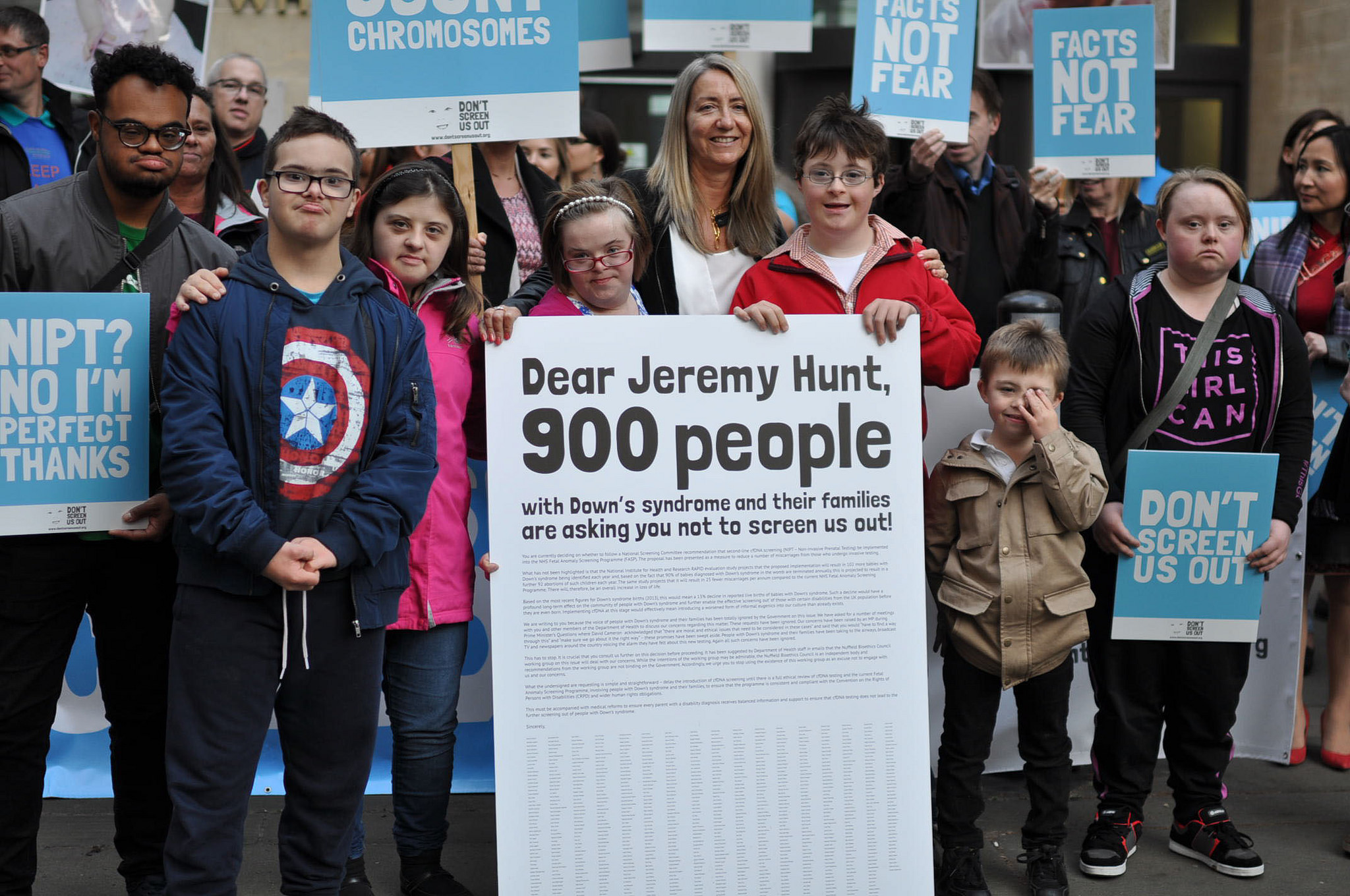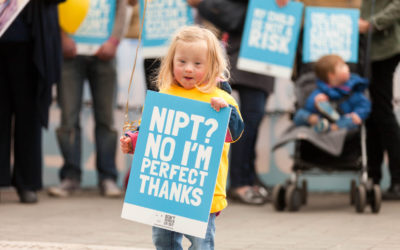People with Down’s syndrome and their families have welcomed the passing of a motion at the BMA Annual Representative (ARM) meeting which commits the BMA to actively lobby the government to undertake a consultation on the views of the public and medical profession on new non-invasive prenatal Testing (NIPT) and the need for limits for the scope of NIPT in practice.
This development will put increased pressure on the Government to undertake a proper consultation and ethical review of NIPT and comes following an ongoing campaign by disability advocacy groups who have been highlighting the widespread ethical problems with NIPT.
The Government have previously admitted that no assessment was made of the impact that the roll-out of NIPT on the NHS would have on the lives of people with Down’s syndrome. In a parliamentary question the Department of Health confirmed that “…no assessment was made of the impact of NIPT on the number of abortions, the Down’s Syndrome community and medical professionals’ and society’s attitudes towards people with Down’s syndrome.”
An open letter signed by 900 people with Down’s syndrome and their families was delivered to Jeremy Hunt demanding that approval of the implementation on NIPT on the NHS be delayed until a proper consultation with the community and a full ethical review of the proposed implementation. A motion that was signed by 34 MPs from across the political spectrum was tabled in support of the community of people with Down’s syndrome asking for a consultation and ethical review to be undertaken.
People with Down’s syndrome and their families have also been taking to the radio, broadcast TV and newspapers around the country voicing the alarm they have felt about the new testing. The airing of Bridget Jones’s Diary star Sally Phillips’ BBC documentary A World Without Down’s Syndrome has generated much discussion nationally about the many issues with Non-Invasive Prenatal testing.
Lynn Murray, spokeswoman for Don’t Screen Us Out and mother of Rachael who has Down’s syndrome said:
“It is now clear that the Government must take action and begin work on a full consultation and ethical review of non-invasive prenatal testing and the need for limits for the scope of NIPT in practice. We are calling on the Government to start on this as soon as possible.”
Dr Mark Pickering said the following in a speech in support of the motion:
“We must ensure that the use of NIPT, with the possible increase in resulting abortions, doesn’t lead to more stigma against children born with genetic conditions, nor a reduction in the support and expertise offered to such children and their families, nor any stigma towards parents who choose knowingly to raise a child with significant genetic condition.”
Dr Zoe Greaves, who proposed the motion and is a Member of the Medical Ethics committee, said the following in her speech in support of the motion:
“In considering the advent of new technologies and the great potential they must offer, we must also sadly safeguard against ways in which they can be abused.”
Dr John Chisholm, who is a Member of the Medical Ethics committee, said the following during the debate around the motion:
“I think that it’s absolutely right that there should be consultation and the views not just of the profession but vitally of the public are sought.”
ENDS
- For more information on the Don’t Screen Us Out campaign, see our website www.dontscreenusout.org or email info@dontscreenusout.org
- For interviews, phone Don’t Screen Us Out spokeswomen: Lynn Murray: (0044) 01313340133, Email: info@dontscreenusout.org
- Photos of past Don’t Screen Us Out events can be downloaded in high resolution and can be used for media purposes here: https://flic.kr/s/aHskFcqyC7
- Videos of past Don’t Screen Us Out events are available here and original files are available on request: https://www.youtube.com/channel/UCwsnM8w6ECwjDIZq0ayHmiA
Background
- The motion that was passed at the BMA ARM reads:
- That this meeting recognises that the advent of new technologies can bring new ethical challenges to light and; believes that given the advent of Non-Invasive Prenatal Testing (NIPT) and the potential for whole Genome Sequencing the time is right for consultation to determine the views of the public and the profession on the need for limits to the scope of NIPT in practice;
- The Department of Health have approved the implementation of second-line cfDNA screening (NIPT – non-invasive prenatal testing) into the NHS Fetal Anomaly Screening Programme (FASP).
- The National Institute for Health and Research RAPID evaluation study projects that the proposed implementation will result in 102 more Down Syndrome foetuses being identified each year and based on the current 90% of parents with a diagnosis that terminate a pregnancy, this is projected to result in 92 more Down Syndrome foetuses being aborted each year. The same study projects that it will result in 25 fewer miscarriages per year compared to the current NHS Fetal Anomaly Screening Programme. There will therefore be an overall increase in loss of lives.
- Given there were 717 Down Syndrome live births in 2013, this would represent a 13% decrease in live births for Down Syndrome – therefore likely having a profound effect on future numbers of people with Down Syndrome in the population.
- A recent report from International Bioethics Committee (IBC ) of the United Nations Educational, Social, and Cultural Organisation (UNESCO ) issues a stern warning about the adoption of NIPT in national screening programmes (http://unesdoc.unesco.org/images/0023/002332/233258e.pdf).
- Private availability of cfDNA testing has already been blamed for a 34% increase in numbers of foetuses aborted with DS and other disabilities in three years.
- National Screening Committee member and RAPID co-author Jane Fisher is also Director of Antenatal Results and Choices (ARC) who have a corporate partnership with Natera, a supplier of the Panorama NIPT screening test: http://www.arc-uk.org/news/193/29/Natera-becomes-ARC-s-latest-partner/d,news-detail. This is an addition to their ‘partnership’ with other NIPT testing providers:http://www.arc-uk.org/support-us/partner-with-us/current-corporate-partners
- NIPT techniques will shortly allow for the testing of the entire human genome, and the targeting of fetuses for abortion based on a range of illicitly considered characteristics.
- The future market for testing could exceed $6 billion in the US alone.



